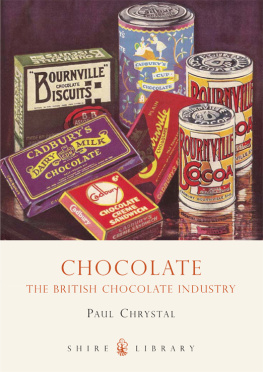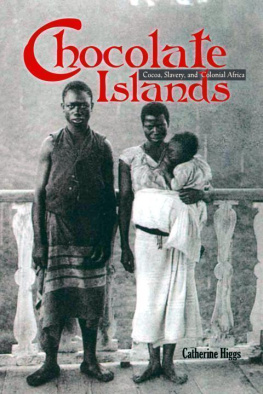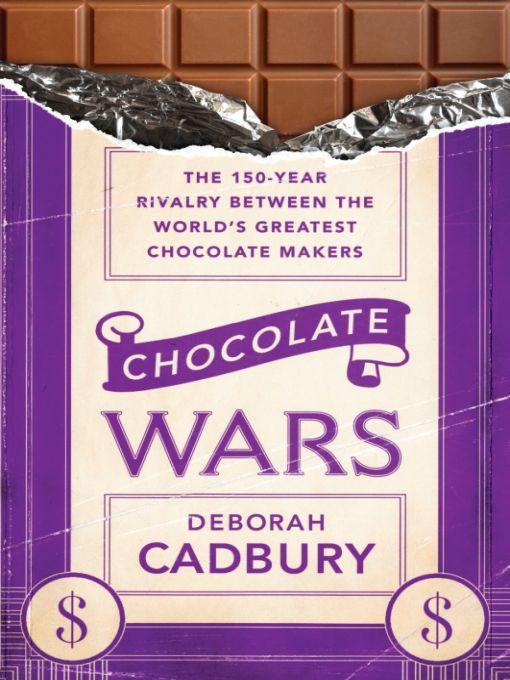Table of Contents
For my mother and Martin with love
Introduction
When I was a young child, the knowledge that a branch of my family had built a chocolate factory filled me with wonder. What sort of charmed life did such a possibility offer to my relatives? Each Christmas I had an insight when the most enormous case arrived from my uncle, Michael Cadbury, containing a large supply of mouthwatering chocolates. Even more memorable was the trip I made in the early 1960s to see how the chocolate was made. Opening the door to the factory at Bournville in Birmingham, I was greeted by a magical sight.
To a childs eyes, it was as though I had entered a cavernous interior that belonged to some benign, orderly, and highly productive wizard who had somehow saturated the very air with a chocolate aroma. My uncle and parents raised their voices against the whirr of machinery. But I did not hear them. All I could see was chocolate. It was all around me in every stage of the process. There was molten chocolate bubbling in vats towering above me, vats so huge that they had ladders running up their sides. Chocolate rivers flowed on a number of swiftly moving conveyers through gaps in the wall to mysterious chambers beyond. Solid chocolate shaped in a myriad of exciting confections travelled in neat soldierly processions towards the wrapping department. Such a miracle of clockwork precision and sensual extravagance was hard to take in. Even more puzzling to my young mind: How did this chocolate feast, which brought the idea of greed to a whole new level, fit with religion? For even though I did not yet understand the connection, I did know that the chocolate works were in some inexplicable way intimately connected with a little-known religious movement known as Quakerism. Was all this the hand of God?
My own father had left the Quaker movement just before the Second World War. He wanted, as he put it, to join the fight against Hitler, a stance that was not compatible with Quaker pacifism. I was brought up in the Church of England, and as a child, when I joined my cousins for Quaker meetings, I felt as if I were on the outside looking in on a strange, even mystical tradition. Long silences endured in bare rooms, stripped of any sign that might excite the senses, where grown-ups contemplated the surrounding void, were incomprehensible to me. Equally incomprehensible: How did my rich chocolate relatives acquire that admirable restraint, that air of wholesome frugality? Even family picnics had a way of turning into long and chilly route marches, raindrops trickling down your back. The wealth and austerity seemed oddly incongruous. Did the one contribute to the other? Cheerful homilies from my father along the lines of Every mickle makes a muckle and Look after the pennies and the pounds will look after themselves did not supply a satisfactory answer. Even a five-year-old knew this was not the key to creating a chocolate factory.
A generation passed before I decided to retrace my steps up Bournville Lane. This time it was personal. I wanted to delve into the Bournville and family archives to uncover the whole story. Turning the corner in the lane in the autumn of 2007, my heart skipped a beat as I was taken back to that day when my father and uncle, both now much missed, had taken me round the factory. To my surprise, the chocolate works seemed even larger than I remembered. Imposing red brick blocks stood beside the neatly mowed lawn of the cricket pitch with Bournville village and green nestled behind. At the time, Cadbury was the largest confectioner in the world and the only independent British chocolate enterprise to survive from the nineteenth century. I wanted to understand the journey that took my deeply religious Quaker forebears from peddling tins of cocoa from a pony and trap around Birmingham to the Titan-like company that reached around the globe.
The story began five generations ago, when a farsighted forbear, Richard Tapper Cadbury, a draper in Birmingham in the early nineteenth century, sent his youngest son, John, to London to study a new tropical commodity that was attracting interest among the colonial brokers of Mincing Lane: cocoa. Was it something to eat or drink? Richard Tapper saw it primarily as a nutritious nonalcoholic drink in a world that relied on gin to wash away its troubles. Never could my abstemiously inclined ancestor have guessed what fortunes were entwined with the humble cocoa bean, although it seemed full of promise: a touch of the exotic.
His grandsons, George and Richard Cadbury, turned a struggling business into a chocolate empire in one generation. In the process, they took on their Quaker friends and rivals, Joseph Rowntree in York, and Francis Fry and his nephew Joseph in Bristol. The Cadbury, Fry, and Rowntree dynasties were built on values that form a striking contrast with business ethics today. Their approach to the creation of wealth was governed by an entire code of practice developed over generations since the Civil War by their Quaker elders and set out at yearly meetings and in Quaker books of discipline. This nineteenth-century Quaker capitalism was far removed from the excesses of the worlds most recent financial crisis, in which business leaders see no harm in pocketing huge personal profits while their companies collapse.
For the Quaker capitalists of the nineteenth century, the idea that wealth creation was for personal gain only would have been offensive. Wealth creation was for the benefit of the workers, the local community, and society at large, as well as the entrepreneurs themselves. Reckless or irresponsible debt was also seen as shameful. Quaker directives ensured that no man should launch into trading and worldly business beyond what they can manage honourably... so that they can keep their words with all men. Even advertising was dismissed as dishonest, mere puffery: The quality of the product mattered far more than the message. Men like Joseph Rowntree and George Cadbury built chocolate empires at the same time as writing groundbreaking papers on poverty, publishing authoritative studies of the Bible, and campaigning against a multitude of heartrending human rights abuses in a world that seems straight out of Dickens. Puritanical hard work and sober austerity, with the senses in watchful restraint, were the guiding principles. Even art, literature, and theater were dismissed as too great an indulgence.
While it is easy to dismiss such values as antiquated notions that governed business life at a time before Darwins ideas had taken root, Quaker capitalism proved extraordinary successful, and its puritanical work ethic generated a staggering amount of worldly wealth. In the early nineteenth century, around 4,000 Quaker families ran 74 Quaker British banks and more than 200 Quaker companies. As they came to grips with making money, these austere men of God helped to shape the course of the Industrial Revolution and the commercial world today.
The chocolate factories of George and Richard Cadbury and Joseph Rowntree inspired men in America such as Milton Hershey, the King of Caramel, who took philanthropy to a new, all-American scale with the creation of the utopian town of Hershey in the cornfields of Pennsylvania. But with the growth of global trade, the appearance of international rivals, and the emergence of a tough breed of entrepreneurs in the twentieth century unshackled by religious convictionmen such as Frank and Forrest Marsthe chocolate wars that followed gradually eroded the values that shaped Quaker capitalism. Some Quaker firms did not survive the struggle, and those that did had to sacrifice their Puritan roots. In the process, ownership of the businesses passed from private Quaker dynasties to public shareholders. Little by little the implications of the transition from Quaker capitalism to shareholder capitalism began to take shape in the form of huge confectionery conglomerates that straddle the corporate world today. The story of four generations of Cadbury brothers and their rivals highlights different phases of this process. The Cadbury chocolate business came of age during the expansion of the British Empire in the Victorian era. It peaked a century later during the post-Cold War era when it became the worlds largest confectionery companyonly to be consumed in turn by global forces in the new millennium.










